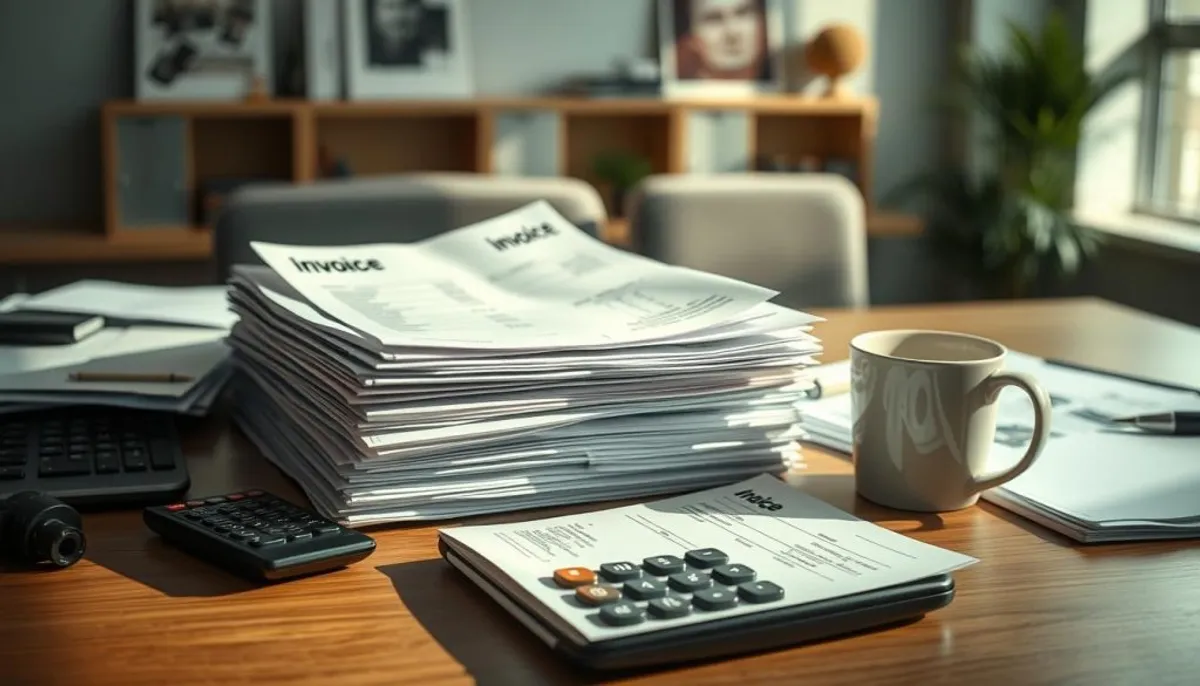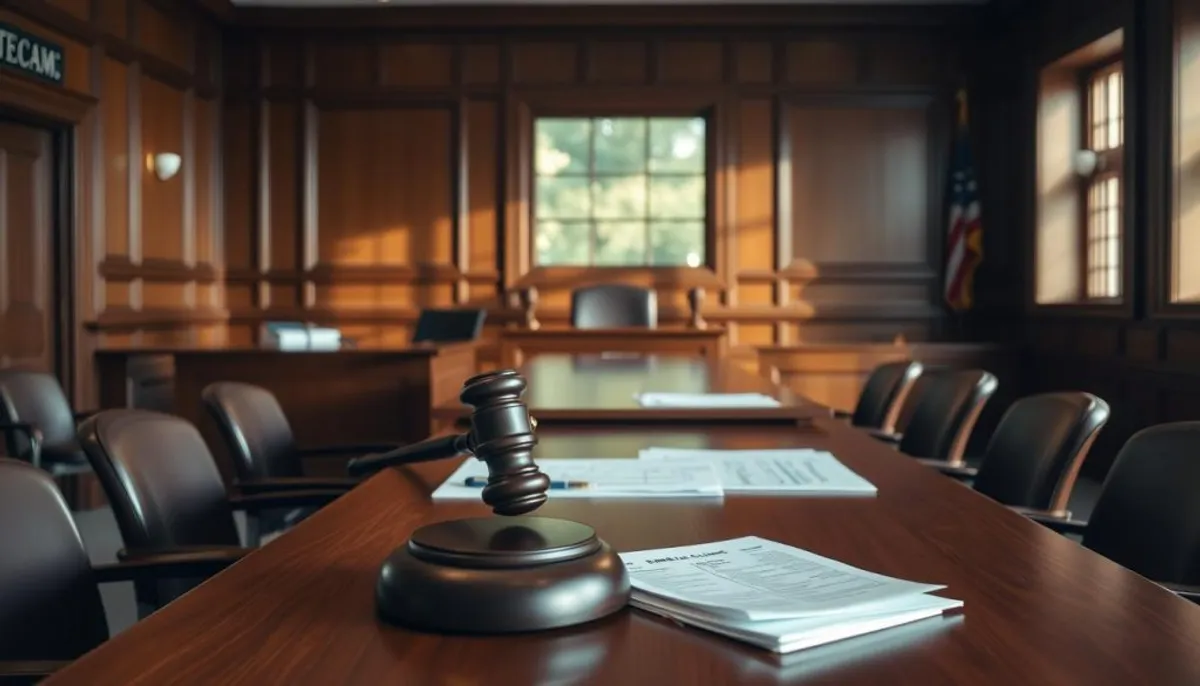Handling unpaid invoices is a common problem for businesses. It can cause financial stress. Business News Daily and experts like Greg Waldorf from Stanford University offer advice. They suggest sending gentle reminders and discussing service satisfaction.
Keeping customer relationships strong while trying to collect debt is key. Clear communication and building trust are essential for solving the issue.
Experts say the first step is to send a gentle reminder. Often, a late payment is just a mistake. This reminder can prompt immediate payment. But, if that doesn’t work, you might need to update and resend the invoice or talk directly to the client.

Key Takeaways
- A late payment reminder is often sufficient to motivate payment.
- Clear communication and trust-building are key to successful debt recovery.
- Effective financial management includes proactive approaches like clear payment terms and advance billing practices.
- Use of legal actions should be carefully considered, weighing the costs versus the debt amount.
- Invoice factoring can provide quick cash flow but may involve fees and impact customer relationships.
Understanding the Impact of Unpaid Invoices
Unpaid invoices are a big problem for businesses. They hurt operational efficiency, cash flow management, and client trust. This part explains how these late payments affect a company’s health.
Cash Flow Challenges
Unpaid invoices mess with cash flow management, which is key for daily operations. A Quickbooks survey found that about $300,000 is owed in late payments. Only 38% of invoices are paid on time.
Poor cash flow is the main reason for 90% of small and medium-sized business failures. Getting cash quickly is crucial, especially when cash is tight.
Time and Resources
Collecting unpaid invoices takes a lot of time and resources. Businesses spend about 14 hours a week on this. This time could be used for more important tasks that boost operational efficiency.
This diversion of resources makes it hard for companies to grow. 89% of SMBs say late payments are a big obstacle to growth.
Customer Relationship Strain
Unpaid invoices can hurt relationships with clients. This can risk future business and damage client trust. The stress from unpaid invoices can lead to awkward talks and might even need legal action.
This can harm a company’s reputation. To avoid this, businesses should keep communication clear and offer flexible payment plans. This helps customers who are facing financial hard times.
Preventive Measures to Avoid Unpaid Invoices
To manage payment expectations and avoid unpaid invoices, businesses need to take steps. They should use proactive billing strategies and plan their finances well. This helps set up a clear plan for handling customer payments.
Clear Payment Terms
Defining clear payment terms before starting a project is crucial. You should state due dates, payment methods, and late fees. This way, businesses can clearly communicate payment expectations, reducing misunderstandings and disputes.
Putting these terms in contracts and invoices helps a lot. It greatly lowers the chance of unpaid invoices.
Advance Billing Practices
Using advance billing practices helps protect against nonpayment. Asking for deposits or full payments upfront, especially from clients with bad credit, is wise. This approach ensures the business gets paid on time and keeps operations running smoothly.
Offering discounts or rewards for early payments can also encourage timely payments. This shows the value of planning finances well.

By combining clear payment terms with advance billing, businesses can avoid the harm of unpaid invoices. This approach strengthens business health and improves client relationships.
Steps to Take When a Customer Doesn’t Pay
When a customer doesn’t pay, start with clear communication and smart actions. Using recovery tactics and tracking invoices can help get payments on time.
Sending Gentle Reminders
Non-payment often happens by mistake. Sending polite reminders can help clients pay on time. These reminders should be friendly, mentioning the amount owed and any previous talks about the invoice.
Keeping a friendly tone helps keep professional relationships strong. This makes talking to clients about payments easier in the future.
Updating and Resending Invoices
If reminders don’t work, update and resend the invoice. Make sure all details are correct to avoid confusion. Also, use tracking systems to see when clients view the invoice.
This shows you’re transparent and helps build trust.
Communicating with the Client
If payment still doesn’t come, talk directly to the client. Discuss the reasons for the delay with understanding. Be empathetic to avoid making things worse.
Use recovery tactics to solve any issues the client mentions. Keeping in touch and being open helps build trust and cooperation over time.
Legal Actions for Handling Unpaid Invoices
Getting paid from customers who owe money can be tough. When all other ways to get paid fail, you might need to go to court. Knowing your legal options helps you make smart choices.
When to Consider Legal Action
Going to court should be a last choice. First, think about the costs and benefits. It’s important to weigh how much you might get back against what you’ll spend and lose in time. Talking to a lawyer can help you understand your chances and how it might affect your business.
Legal action is best for big debts, especially with companies.
Using Small Claims Court
Small claims court is a simpler way to get back smaller debts. In Scotland, you can sue for up to £5,000. In Northern Ireland, it’s up to £3,000. And in England, you can use Money Claim Online for debts under £10,000.
Even though it’s easier, getting a case ready and waiting for a decision takes time. You can also use statutory demands for debts over £750. This could lead to the other side facing bankruptcy.

Working with an Attorney
Talking to a lawyer is very helpful. They can guide you through the legal steps and tell you if it’s worth it. They help with paperwork, go to court with you, and try to settle the case.
Lawyer fees vary based on the case’s size. They can be as low as £25 or up to 4.5% for online cases. Having a lawyer makes sure everything is done right and boosts your chances of getting paid back.
Alternative Solutions for Managing Unpaid Invoices
Unpaid invoices are a big problem, with 94% of accountants and bookkeepers in the U.S. dealing with late payments. Businesses can try different solutions like using invoice factoring services or hiring collection agencies.
Invoice Factoring Services
Invoice factoring services help businesses manage their accounts better. They sell unpaid invoices at a discount to get cash quickly. This way, companies get funds right away, but they get less than the full invoice value.
Collections Agencies
Debt collection services are another good option. Professional agencies can help get overdue payments back. They take a big part of what they collect as their fee. But, using aggressive tactics can harm future business relationships.
Both invoice factoring and collections agencies can help with unpaid invoices. Here’s a comparison:
| Solution | Benefit | Consideration |
|---|---|---|
| Invoice Factoring Services | Immediate cash flow | Partial invoice value received |
| Collections Agencies | Professional debt recovery | Potential customer relationship strain |
Creating a Payment Plan
When clients face financial challenges, a payment plan can help both sides. It lets businesses offer flexible payment options. This way, customers can pay off their debts in installments. It’s important to write down the plan to avoid misunderstandings.
A payment plan makes collecting money easier by following a set schedule. The amount and frequency of payments can change. This flexibility is a big plus for everyone involved. It’s crucial to agree on the details before starting, as changes are hard to make later.
Here are some key points to include in a payment plan:
- Fixed installment amounts, number of installments, or time intervals between payments.
- A detailed schedule and adherence to payment due dates.
- Potential inclusion of AutoPay to ensure timely collections, requiring customer approval before installments commence.
- Notification procedures for failed payments, prompting customers to update payment information as needed.
Good payment plans can lead to better compliance and smoother cash flow. They also help avoid unpaid invoices, which are less likely to be paid after 90 days. Using efficient systems can greatly reduce late payment issues.
It’s important to check if customers are sticking to the plan. Using legal methods can help ensure they do. This builds trust and helps both the business and the client in the long run.
| Element | Description |
|---|---|
| Installment Amounts | Fixed or variable amounts per payment. |
| Installment Frequency | Flexible intervals between payments. |
| AutoPay Option | Automated collection with customer approval. |
| Notification Process | Alerts for failed payments and updates required. |
By being clear and using installment agreements, businesses can work well with clients. This ensures payments are made on time while giving clients the flexibility they need.
Best Practices for Managing Unpaid Invoices
Keeping unpaid invoices to a minimum is key for any business’s financial health. By following best practices, companies can keep their cash flow smooth and their customer relationships strong. Here, we’ll look at important ways to handle unpaid invoices well.
Maintaining Professionalism
It’s vital to stay professional, even when dealing with tough issues like unpaid invoices. A friendly and respectful attitude can stop communication problems, which often lead to payment disputes. Being polite and on time with follow-ups can lead to quicker payments and keep customer relationships good.
Using Invoicing Software
Getting digital billing solutions can make managing invoices much better. Invoicing software makes billing easier, tracks invoices better, and sends reminders automatically. Tools like QuickBooks and FreshBooks cut down on mistakes and save time, which are big reasons for unpaid invoices.
Implementing Late Fees
Having a clear fee structure is also a smart move. Late fees can encourage on-time payments and make up for lost revenue. Make sure to clearly state these fees in your payment terms to avoid confusion. This method helps keep payments on time and manages cash flow problems from late invoices.
| Strategy | Effectiveness | Notes |
|---|---|---|
| Maintaining Professionalism | High | Encourages positive customer relationships |
| Using Invoicing Software | Very High | Automates reminders and reduces manual errors |
| Implementing Late Fees | Medium | Requires clear communication and policy |
Conclusion
Managing unpaid invoices is key for businesses. They need to focus on solving financial issues and keeping clients happy. Unpaid debts can really hurt a company’s cash flow and lead to extra costs.
Setting clear payment terms and using advance billing can help avoid late payments. Services like invoice factoring and collections agencies can also help recover debts. It’s important to stay professional and use invoicing software to make the process smoother.
Businesses that handle unpaid invoices well can avoid financial risks. They should be ready for legal actions and keep communication professional. Around 30% of small businesses face problems because of unpaid invoices, showing the importance of careful management.
By focusing on solving financial issues and keeping clients happy, companies can recover debts. This approach also helps keep clients and keeps the business financially healthy in the long run.
RelatedRelated articles



